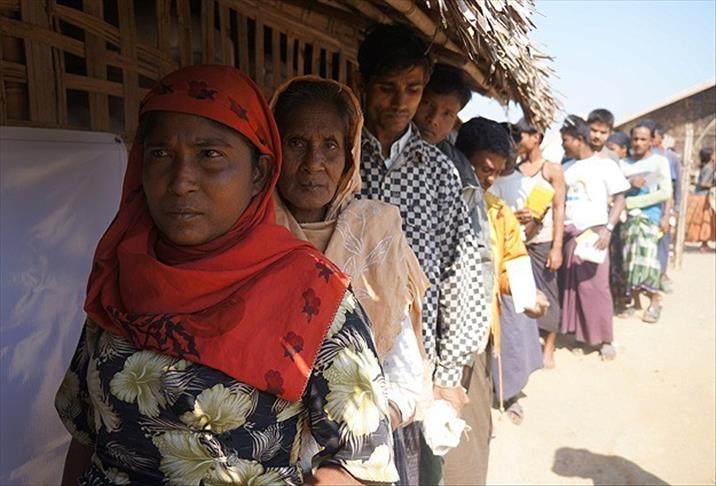
By Joshua Carroll
YANGON, Myanmar
Top officials from Myanmar's government and military will meet with the country's major political parties and ethnic groups for the first time Friday - but groups representing minority Rohingya Muslims will be excluded from the talks.
Aung San Suu Kyi, leader of the opposition National League for Democracy, will attend along with coalition parties representing various ethnic minorities to discuss the country's political deadlock, the Irrawaddy website reported.
Participants believe topics including the country's democratic reforms, national reconciliation and peace talks with ethnic rebels will be up for discussion.
But the treatment of the long-persecuted Rohingya, which has tarnished President Thein Sein's reformist image abroad, is unlikely to be on the agenda, Muslim groups say.
The minority has born the brunt of Buddhist on Muslim violence that began in 2012 and is widely considered a threat to the reform process.
Wali Ullah, leader of the pro-Rohingya National Democratic Party for Development, told the Anadolu Agency on Thursday that his party had not been invited to Friday's meeting in the capital of Nay Pyi Taw.
"National reconciliation is only for Buddhists," he said.
He added that he believed the meeting has been orchestrated to assuage U.S. fears about backsliding on reforms ahead of a visit by Barack Obama next month.
Myanmar's government has promised to achieve a nationwide cease-fire with major rebel militias before next year's landmark general election. But bouts of fighting have continued despite the fact most groups have signed agreements.
Suu Kyi is likely to use the meeting to push for amendments to Myanmar's 2008 constitution, which bars her from becoming president and guarantees the military 25 percent of all seats in Parliament - giving them an effective veto over constitutional changes.
The pro-democracy icon has disappointed her foreign supporters by failing to speak out against anti-Muslim violence, which has killed at least 280 people and forced over 140,000 others from their homes, mostly Rohingya.
Myanmar began drastic political and economic reforms in 2011 after the military junta handed power to a quasi-civilian government.
Conflict, rights abuses threaten Myanmar reforms: UN
Major reforms in Myanmar over the last three years are at risk of being undermined by civil conflict and ongoing human rights abuses, the U.N.’s special rapporteur on human rights said in her first General Assembly address.
Yanghee Lee said President Thein Sein’s nominally civilian government has improved the political, economic and social human rights landscape since taking over from the ruling military junta in 2011, but stressed that “more is required” to “win the support of the people of Myanmar,” according to a U.N. statement released Thursday.
She said that various conflicts with ethnic rebels are still causing “significant suffering” to an estimated 613,000 people displaced in the fighting.
She added that the situation in western Rakhine state following interreligious rioting in 2012 “remains profoundly disturbing”.
An estimated 140,000 people - mostly from the persecuted Rohingya Muslim minority - have been segregated in squalid camps on the outskirts of Sittwe, the state capital, after their homes were destroyed in the riots.
Several thousand Buddhists still live in camps closer to the town center, where conditions are less severe.
“Conditions in both Buddhist camps and Rohingya Muslim camps require urgent attention,” said Lee.
In March, aid agency workers were temporarily forced to flee Sittwe after hundreds of Buddhist Rakhine nationalists attacked their homes and offices.
The evacuation deepened an already severe health crisis in the Rohingya camps, prompting international outrage.
Lee also criticized recent backsliding on media reforms, and said “laws are still being used to criminalize and impede the activities of civil society and the media.”
Earlier this month, three reporters and the two owners of their newspaper, the Bi Mon Te journal, were sentenced to two years each in prison after publishing an article that mistakenly claimed opposition parties had formed an interim government.
And in July, four journalists and the CEO of the Unity Journal were given ten years hard labor for a report alleging the government had built a chemical weapons factory on 3,000 acres of land stolen from farmers in central Magwe Region.
On next year’s general election, Lee warned of potential government “bias” during campaigning and called for an end to “restrictive rules”.
In April, Election Commissioner Tin Aye said politicians would only be allowed to campaign in their own constituencies, a move that was regarded as an attempt to stifle opposition leader Aung San Suu Kyi.
Suu Kyi and her party, the National League for Democracy, are very popular in Myanmar. In a 2012 by-election, Suu Kyi attracted large crowds as she toured the country to garner support for the party.
“As we move towards the 2015 election, I urge greater commitment to ensure that the right to vote and the freedoms of expression, assembly and association are fully protected,” Lee said.
Anadolu Agency website contains only a portion of the news stories offered to subscribers in the AA News Broadcasting System (HAS), and in summarized form. Please contact us for subscription options.

